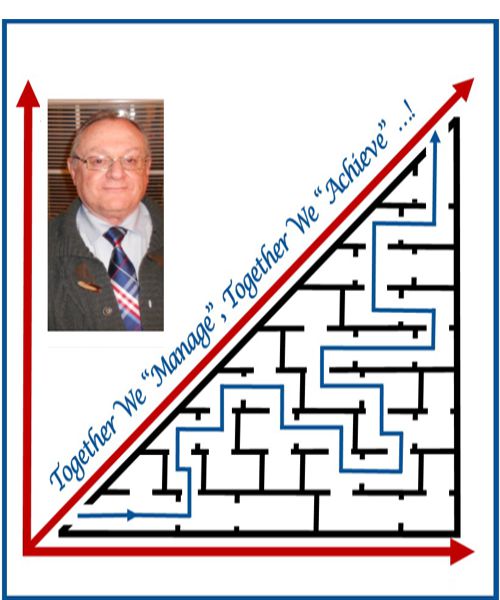Viewpoint
» On "Teaching"
» On "Learning"
» On "Knowledge"
» On "Goals"
» On "Time"
» On “Management”
» On “Reading”
» On "Committees"
» On "A Place to Visit"
» On "Human Resources"
» On "Progress & Development"
» On "History"
» On "Public Speaking"
» On "Organizing"
» On "Motivation"
» On "Teams"
» On "Communication"
» On "Management Coaching"
» On "Traveling"


On "Teams"
By Adel J. Helou
In the beginning, people discovered that working in groups made it easier to reach a goal. The goal could be related to survival, to social activities, or to economic achievements. Later, as concept of specialization gained a prominent place in human societies, it was natural that smaller groups were formed to handle various activities. It is at that time that the concept of teams seems to have developed in human societies. These teams were formed to tackle specific specialized tasks. Each team handling their respective task(s). Early teams were formed around one skilled and talented person. That person was considered the Champion of the team. The other members of the team were there to support that individual with their basic strengths and limited knowhow. The champion would win (or would lose) a competition in the name of the team.
It must have happened that one team made an extra effort and managed to train and develop a second champion. The team was sent to compete with two champions amongst its members. That must have caused and ensured their success and victory over the competition. From that moment onward, it was obvious and logical that more members – if not all members – of a team should be developing more and better skills and acquiring more knowledge to be able to compete socially and professionally. A team with all its members highly trained and skilled in their field(s) of interest and specialty will have a better competitive advantage over other less prepared teams.
Today, and especially in the professional world, it is expected to find in most - if not all – businesses and enterprises, highly qualified and talented teams with highly qualified members working to achieve their respective goals. Having such high-performance teams give business enterprises an advantage in this highly competitive market.
Moreover, the concept of forming and using teams is adopted by business enterprises especially the large and exceptionally large among them. That is because of the complexity and multi-facet aspect of their activities. The concept of teams is appropriate and can be also used by medium and small size businesses especially in today’s business and market environment.
Teams are used to handle a business short term or critical functions and tasks from within the various departments of an enterprise. They could also be formed by the executive body of an enterprise to tackle tasks related to business or operational strategy and/or finances. You can find in Figure-1 some of the tasks that can be handled by a team or a task force.
|
A team is formed to successfully achieve a certain goal. Therefore, it is wise to choose the members of a team who are knowledgeable with all the skills and talent needed to effectively reach the aspired results. This should ensure that the team will complete the task at hand in its entirety and correctly to meet the required quality. The team must also have a sense of time. The team must work within the time frame set forth by the assigning body and deliver the results to their offices at or before the deadline. For the above four (quantity, quality, timing, location) requirements to be achieved, the team members must work together in a coordinated manner. The team members should also cooperate. They should not compete with one another. Some basic attributes of successful teams are stated in Figure-2.
|
Additional qualifications of each member of successful teams should include knowledge in more than one aspect regarding the task as well as multiple skills pertinent to that task. Cross training members would help team members to cover for one another in case of emergency or absence. Ideally, team members should also be friends and spend time together outside the work environment to develop a sense of camaraderie that would enhance respect, communication, honesty, and understanding of one another. Such camaraderie will help the team to identify the strong points of each of its members and develop those points.
Forming strong and focused teams will be an asset to any enterprise trying to reach their goals quickly and successfully in today’s market.<
Adel J Helou: is a Business and Life Management Coach. He has more than 15 years of experience in production and operations management. The Author has international professional experience in the Middle East markets. He holds a B.Sc. degree in Chemistry and Physics and an M.Sc. in Chemical Engineering. Mr. Helou has pages on Facebook, LinkedIn, Twitter, and Instagram:
facebook.com/AdelJosephHelouManagementCoach/
linkedin.com/in/adeljosephheloumanagementcoach/
Instagram.com/adel.helou
twitter.com/helou_adel
Read about his Management Coaching and the articles he writes, by visiting the electronic magazine (E-Zine): optimanage.com.
The E-Zine has a fb page: facebook.com/optimanagedotcom/.
A.J. Helou can be contacted by e-mail: a.j.helou@optimanage.com (e-mail)
linkedin.com/in/adeljosephheloumanagementcoach/
Instagram.com/adel.helou
twitter.com/helou_adel
Read about his Management Coaching and the articles he writes, by visiting the electronic magazine (E-Zine): optimanage.com.
The E-Zine has a fb page: facebook.com/optimanagedotcom/.
A.J. Helou can be contacted by e-mail: a.j.helou@optimanage.com (e-mail)





